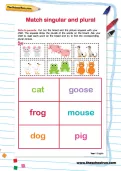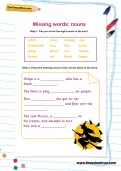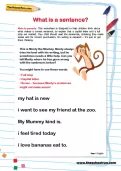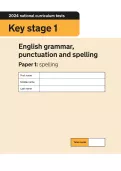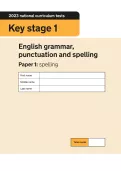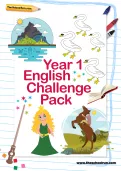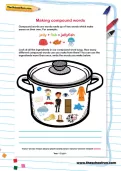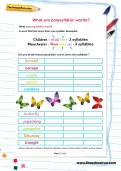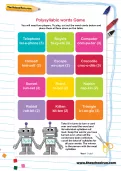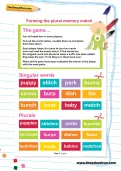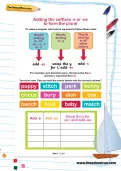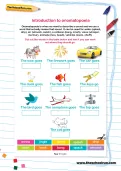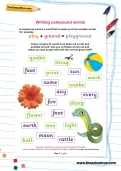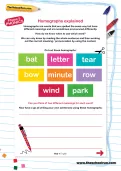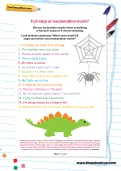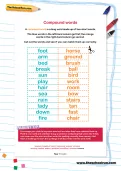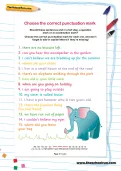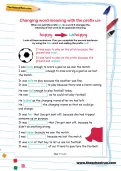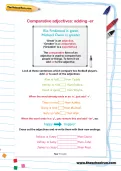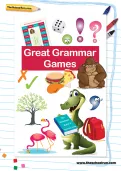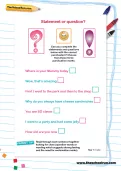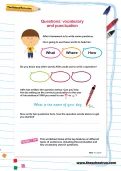Year 1 Grammar worksheets
Free worksheets: Grammar, KS1, Y1
You’ll need to login or Register first to access these worksheets for free.
Once you’ve tried out our free worksheets, why not explore all our resources (1000s of worksheets, interactive tutorials, learning packs and more) with a 14-day FREE trial subscription.
Match singular and plural
This worksheet is designed to help your child understand how to say the singular and plural versions of different animals' names.
Missing words: nouns
Spot the nouns then place the missing nouns in the correct place in the story.
What is a sentence?
This worksheet gives sentences that need correcting with regards to word order or punctuation.
Key Stage 1 - 2024 English SATs Papers
Help your child prepare for the optional English KS1 SATs, taken at the end of Year 2, with some at-home practice. These complete Y2 SATs past papers from 2024 are the official Department for Education papers used in schools.
Key Stage 1 - 2023 English SATs Papers
Help your child prepare for the English KS1 SATs, taken at the end of Year 2, with some at-home practice. These complete Y2 SATs past papers from 2023 are the official Department for Education papers used in schools.
Year 1 English Challenge Pack
Challenging reading comprehensions and activities for Year 1 readers and writers, designed to stretch your child and offer them the opportunity to explore their year-group topics in greater depth.
Making compound words
Look at all the ingredients in our compound word soup. How many different compound words can you make from them?
What are polysyllabic words?
A polysyllabic word is a word that has more than one syllable. Can you break these polysyllabic words down into syllables?
Polysyllabic words Game
To play, cut out the word cards and place them all face down on the table. Take it in turns to turn a card over and read the word and its individual syllables out loud. Keep the words you have turned over; when all the cards have been collected, count the total of syllables for all your words. The winner
is the person with the most syllables.
is the person with the most syllables.
Forming the plural memory match
Cut out the words below, muddle them up and place them face down. Each player takes it in turns to turn two cards over and read the words aloud. If the words are the singular word and its plural when a suffix has been added they keep the pair; if not they turn them back over. When all the pairs have been collected the winner is the player with the most pairs.
Adding the suffixes -s or -es to form the plural
Can you sort these singular words into the correct column to show how you'd form the plural?
Introduction to onomatopoeia
Onomatopoeia is when we want to describe a sound and we use a word that actually makes that sound. It can be used for water (splash, drip), air (whoosh, swish), a collision (bang, crash), voice (whisper,
murmur), animals (moo, tweet), vehicles (zoom, chuff). Cut out the words in the table below and see if you can work out where they should go:
murmur), animals (moo, tweet), vehicles (zoom, chuff). Cut out the words in the table below and see if you can work out where they should go:
Writing compound words
A compound word is a word that is made up of two smaller words, for example: play + ground = playground. These compound words have been cut in half and jumbled around. Can you cut these words out and match up each purple half with the correct green half?
Homographs explained (Phase 5 phonics)
Cut out these homographs. Can you think of two different meanings for each word? Now have a go at writing your own sentences using these homographs
Full stop or exclamation mark?
We use exclamation marks when something is funny or scary or if we are shouting. Look at these sentences. Which ones need full stops and which need exclamation marks?
Compound words
A compound word is a long word made up of two short words. The blue words in the left-hand column go first; the orange words in the right-hand column go second. Cut out the words and see if you can match them up correctly.
Choose the correct punctuation mark
Should these sentences end in a full stop, a question mark or an exclamation mark? Choose the correct punctuation mark for each one, and don’t forget to add in capital letters if they’re missing!
Changing word meaning with the prefix un-
When we add the prefix un- to a word it changes the meaning of the word to its opposite meaning. Look at these sentences. Can you complete the second sentence by using the blue word and adding the prefix un-?
Comparative adjectives: adding -er
The comparative form of an adjective is used to compare two people or things. To form it we add -er to the adjective. Look at these sentences which compare two football players and add the correct ending to the adjectives.
Missing words: nouns
Spot the nouns then place the missing nouns in the correct place in the story.
Great Grammar Games
From proper nouns to pronouns, statements to subordinate clauses and articles to adverbs, help your child revise grammar the fun way with our Great Grammar Games learning pack. A friendly, grammar- and flamingo-obsessed Grammar Gator offers tips, tricks, exercises and activities to help your child practise all aspects of basic English grammar in play-packed sessions.
Statement or question?
Can you complete these statements and questions with the correct punctuation? Look for clues (question words or wording which suggests strong feeling and the need for exclamation marks).
Questions: vocabulary and punctuation
Alfie’s homework is to write some questions. He is going to use these words to help him: what; where; how. Do you know any other words Alfie could use to write a question? Can you also add the correct punctuation for a question?
